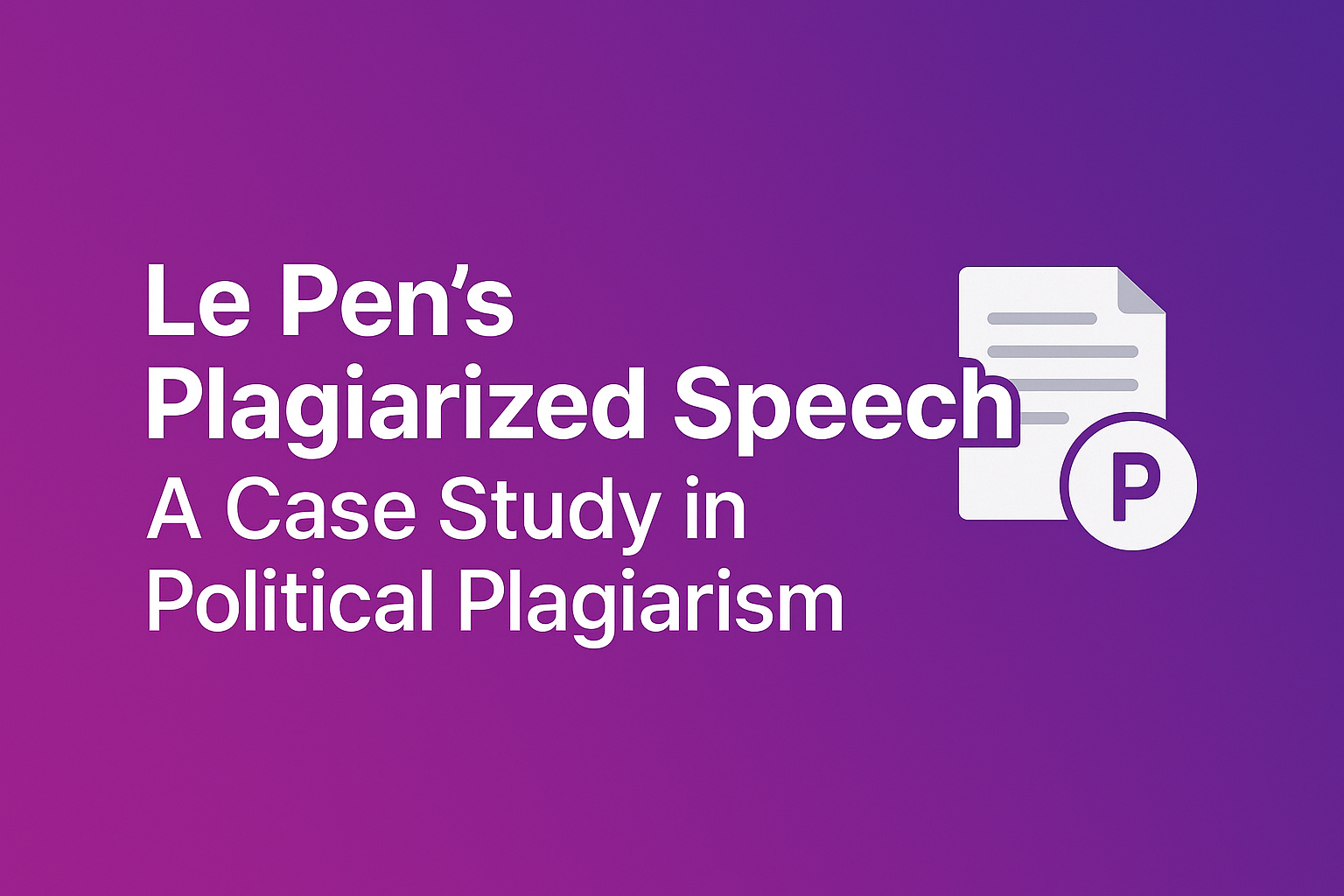
How to Avoid Plagiarism in Your Writing: Essential Strategies
Discover practical techniques to ensure originality in your writing and avoid the serious consequences of plagiarism in academic and professional contexts.
Read articleCheck your papers for plagiarism with our advanced AI tools


In May 2017, during the heated final days of the French presidential election, far-right candidate Marine Le Pen delivered a speech that quickly became notorious—not for its content, but for its origin. Large portions of the speech were lifted almost verbatim from a speech given by her former rival, conservative candidate François Fillon, just weeks earlier. This incident provides a fascinating case study on plagiarism in politics, its detection, consequences, and broader implications for public discourse.
On May 1, 2017, between the two rounds of the French presidential election, Marine Le Pen addressed supporters at her May Day rally in Villepinte, near Paris. The speech was designed to appeal to Fillon's conservative voters after he had been eliminated in the first round of voting.
Almost immediately, journalists and social media users began noting striking similarities between Le Pen's speech and one Fillon had delivered on April 15, 2017, at a rally in Lyon. The similarities weren't just thematic—in many cases, Le Pen had used identical phrasing, entire sentences, and even complete paragraphs from Fillon's earlier address.
Among the most notable examples:
Fillon (April 15): "France is a history, a geography, but it is also a set of values and principles transmitted from generation to generation, like passwords."
Le Pen (May 1): "France is a history, a geography, but it is also a set of values and principles transmitted from generation to generation, like passwords."
Another example:
Fillon: "This is what France is about: a voice and a special place in the world, a history made of glory and trials, a fervent patriotism and a desire for openness."
Le Pen: "This is what France is about: a voice and a special place in the world, a history made of glory and trials, a fervent patriotism and a desire for openness."
The similarities continued throughout approximately three minutes of Le Pen's 15-minute speech, particularly in passages about France's global role, cultural heritage, and relationship with neighboring countries.
The plagiarism was first identified by Paul Reenfel of the Ridicule TV YouTube channel, who created a side-by-side video comparison of the two speeches that quickly went viral. Social media amplified the discovery, and mainstream media outlets soon picked up the story.
This case demonstrates how modern technology and social media have made it increasingly difficult for public figures to plagiarize without detection. The speed with which the comparison spread online shows how plagiarism detection has become democratized in the digital age.
Faced with irrefutable evidence, Le Pen's campaign took a surprising approach: they admitted to the borrowing but framed it as deliberate. Florian Philippot, a top Le Pen aide, told Radio Classique:
"It's a nod and a wink. It's a form of tribute to a speech about France that she admired."
Meanwhile, Le Pen's campaign director David Rachline claimed the similarity was "completely assumed" and represented a form of outreach to Fillon's supporters.
François Fillon, through his spokesman, expressed surprise that someone who had spent the entire campaign "anti-Fillon" would suddenly appropriate his words. The spokesman noted: "It shows a sense of panic. She is attempting to steal Fillon's voice, which doesn't match her program at all."
Le Pen's speech demonstrates several classic forms of plagiarism:
What makes this case particularly interesting is that it wasn't an obscure source—Le Pen borrowed from a widely broadcast speech by a major political figure given just weeks earlier.
Several factors made this plagiarism especially notable:
Political Calculation: The borrowed passages specifically addressed themes important to Fillon's conservative base, suggesting a deliberate strategy to appeal to his voters.
Ideological Inconsistency: Some of the plagiarized content expressed values that seemed at odds with Le Pen's previous positions, particularly regarding France's role in Europe and global affairs.
Timing: The plagiarism occurred at a critical moment between election rounds when Le Pen needed to broaden her appeal beyond her core supporters.
The plagiarism scandal came at a crucial moment in the campaign and had several negative effects:
Media Distraction: The story dominated news cycles for several days, overshadowing Le Pen's policy messages.
Credibility Damage: The incident raised questions about Le Pen's authenticity and the depth of her own ideas.
Mockery: The incident sparked widespread ridicule on social media and in satirical programs, undermining her gravitas as a presidential candidate.
While it would be an overstatement to claim the plagiarism scandal alone determined the election outcome, it certainly didn't help Le Pen's already difficult path to victory. Emmanuel Macron went on to defeat her by a significant margin (66.1% to 33.9%) in the May 7 runoff.
Beyond the immediate electoral consequences, the plagiarism incident has had lasting effects:
It became part of Le Pen's political narrative and is frequently referenced in discussions about her credibility.
It has been used as a case study in political communications courses on what not to do.
It heightened awareness of plagiarism in political speeches, leading to increased scrutiny of other politicians' remarks.
Le Pen's case is far from isolated. Other notable political plagiarism incidents include:
Melania Trump's 2016 Republican National Convention speech, which borrowed passages from Michelle Obama's 2008 Democratic National Convention address
Joe Biden's plagiarism scandal during his 1988 presidential campaign, where he used portions of speeches by UK Labour Party leader Neil Kinnock
Canadian Conservative leader Pierre Poilievre's 2020 parliamentary speech that copied sections from the Wall Street Journal
Several factors contribute to political plagiarism:
Pressure and Volume: Politicians deliver numerous speeches, often with limited preparation time.
Speechwriting Teams: Many politicians rely on teams of writers, creating potential for oversight or intentional copying.
Effective Language: When certain phrases or arguments resonate with audiences, there's temptation to repurpose them.
Shared Political Discourse: Politicians frequently draw from common ideological traditions and rhetorical pools.
Le Pen's case raises important questions about the standards we should apply to political communication:
Attribution Expectations: Should political speeches include citations like academic papers, or is some borrowing accepted?
Originality vs. Tradition: How do we balance expectations for original thinking with the reality that political discourse often builds on established ideas and rhetorical traditions?
Transparency: What level of transparency should we expect about the authorship of political speeches?
Proper Attribution: When borrowing ideas or phrasing, acknowledge the source, even informally ("As François Fillon rightly noted...").
Transformation: If using another's ideas, substantially transform them to fit your own voice and philosophy.
Research and Vetting: Implement a process to verify originality before delivering speeches.
Transparency: Be open about speechwriting practices and collaborative processes.
Critical Evaluation: Assess politicians not just on their words but on the authenticity and consistency of their ideas.
Context Consideration: Understand that some political rhetoric draws from shared traditions and historical references.
Equal Scrutiny: Apply consistent standards when evaluating plagiarism allegations across the political spectrum.
The Le Pen plagiarism incident is more than just a scandal—it raises fundamental questions about authenticity in political discourse. In a media environment where words are endlessly recorded, compared, and analyzed, politicians face a choice: develop an authentic voice or risk exposure when borrowing others' words.
The most effective political communicators don't need to appropriate others' language because they have developed their own distinctive voice, rooted in genuine beliefs and principles. When politicians resort to plagiarism, it often reveals not just ethical lapses but deeper questions about their authentic political identity.
As voters, we should demand not just technical originality but authentic communication that genuinely represents a politician's values and vision. The Le Pen case reminds us that in politics, as in other domains, words matter—not just for what they say, but for what they reveal about the speaker's integrity and depth of conviction.
In an era of increasing political cynicism, authenticity remains one of the most powerful and scarce resources in public discourse. Le Pen's borrowed words stand as a cautionary tale about the risks of sacrificing authenticity for expediency in the pursuit of political power.

Discover practical techniques to ensure originality in your writing and avoid the serious consequences of plagiarism in academic and professional contexts.
Read article
Learn how to effectively use plagiarism detection tools to ensure the originality of your content.
Read article
Learn how to identify different forms of plagiarism and understand the serious consequences of this academic offense.
Read article